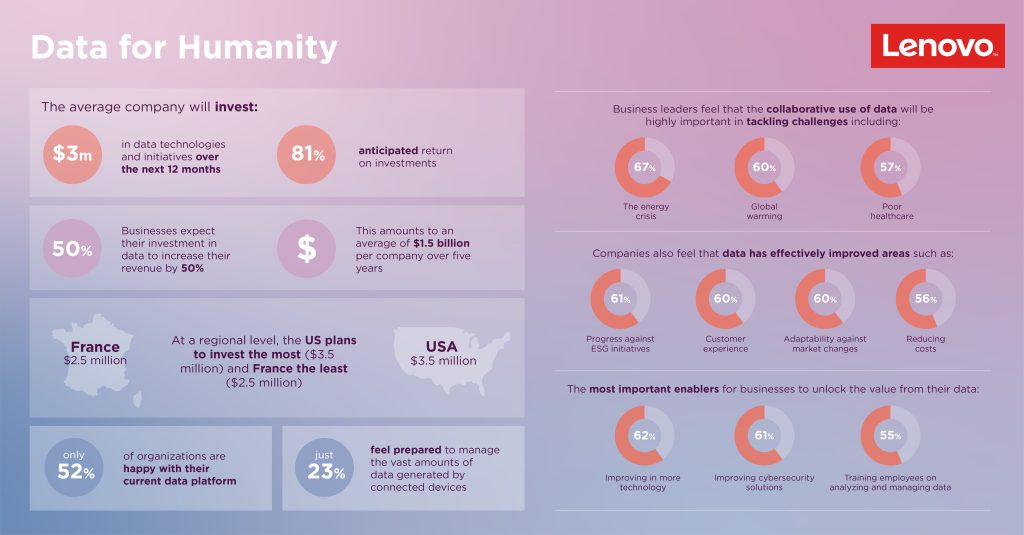Lenovo study shows businesses are set to invest an average of US$3 million in data technologies to help balance profit and purpose.

Lenovo has announced the results of the Data for Humanity report, which cites a collaborative approach to data as fundamental to improving global stability and security.
The research indicates that companies successfully using data across several business areas are more likely than others to be taking action against humanitarian challenges. This same group, dubbed Data Leaders, are already benefitting financially too, with over three-quarters (78%) having increased their revenues over the past 12 months, compared to only half (50%) of those not fully harnessing their data.
With an expectation to increase their revenues by 50%, the study also finds that companies will invest an average of US$3million in data technology and initiatives over the next 12 months. But while profit is undoubtedly important in these turbulent times, purpose is equally front of mind for business leaders.
Pioneering data for good
In the study, data is regarded as a solution for helping companies address humanitarian challenges while improving financial stability, with a quarter (26%) of respondents indicating they want to do more with their data to benefit humanity.
The results indicate that the energy crisis is regarded as the biggest threat over the next three years, with nearly three-quarters (71%) of executives expecting it to have a moderate to severe impact on their business. This is followed by the threats of global warming (59%), poor healthcare (53%) and income inequality (52%).
However, only two-fifths (40%) of respondents indicated their company is taking steps in the next three years to tackle the energy crisis, falling lower for global warming (33%), poor healthcare (22%) and income equality (18%).
Collaboration for innovation
As datasets and analytical capabilities grow, senior executives believe that a collaborative approach to data will be fundamental to improving global stability and security. While over a fifth (23%) do not know how to use data in a way that has a human impact, many feel that collaboration can benefit humanitarian purposes, innovation, as well as profitability.
Businesses are already sharing data with external partners and organisations to help improve education (46%) and commerce (46%), strengthen democracy and human rights (44%), support environmental initiatives (43%) and enable innovation (43%).
Those yet to participate in data partnerships and ecosystems cite cost as the biggest barrier (60%), followed by concerns around security (57%) and risk and compliance (57%).
The Data Leaders
Lenovo’s research identifies an elite group called the Data Leaders, making up 15% of the sample and Data Followers, making up 37% of the sample.
Over the next three years, the Data Leaders are more likely than the Data Followers to be taking action against the energy crisis (60% of Leaders vs 33% of Followers), poor healthcare (29% of Leaders vs 18% of Followers), poor education (61% of Leaders vs 25% of Followers) and global warming (34% of Leaders vs 29% of Followers).
They also better understand the importance of data in solving these challenges and their most effective use of data is in progressing environmental, social and governance (ESG) initiatives (96%). In contrast, only a minority (41%) of Data Followers say they are effective here.
Methodology
The data comes from a survey of 600 C-suite executives and those reporting directly to C-suite. It was commissioned by Lenovo and conducted by FT Longitude in September 2022.
The respondents represent a range of industries: transportation and logistics, business services, technology, media and telecoms, real estate and construction, pharma, medical and biotech, hospitality and leisure, industrial and chemicals, financial services, energy, mining or utilities, consumer and retail.
Click below to share this article


